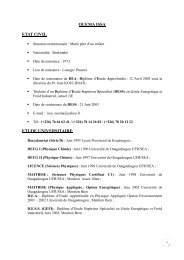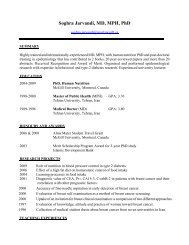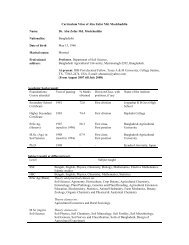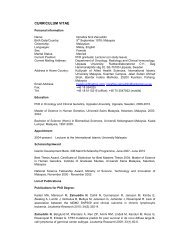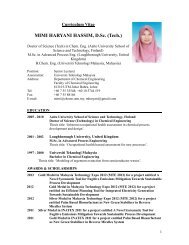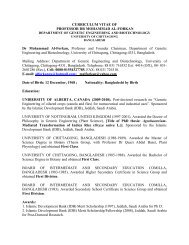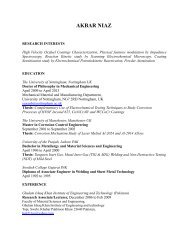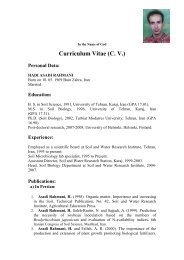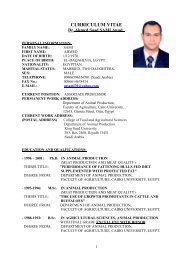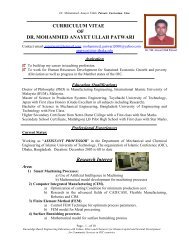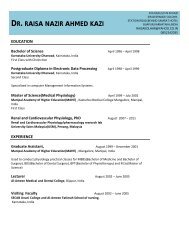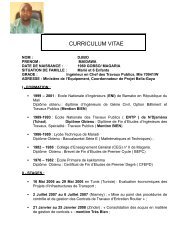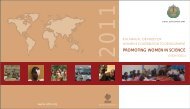Engineering: issues, challenges and opportunities for development ...
Engineering: issues, challenges and opportunities for development ...
Engineering: issues, challenges and opportunities for development ...
Create successful ePaper yourself
Turn your PDF publications into a flip-book with our unique Google optimized e-Paper software.
ENGINEERING: ISSUES CHALLENGES AND OPPORTUNITIES FOR DEVELOPMENTThe rise <strong>and</strong> fall of engineering <strong>and</strong> prospects<strong>for</strong> resurgence<strong>Engineering</strong> at UNESCO rose in the early years to be the largestof the three initial <strong>and</strong> continuing theme areas of UNESCO,together with the basic sciences <strong>and</strong> the environmental <strong>and</strong>ecological sciences. Over the last fifty years the engineeringprogramme has had around one hundred professional <strong>and</strong>support staff, a regular programme budget of over US$50million <strong>and</strong> extra-budgetary funding of over US$200 million(mainly UNDP special funds in the mid-1960s to the early1990s). <strong>Engineering</strong> at UNESCO began to decline in real termsin the 1990s (in terms of staff <strong>and</strong> budget), which reflectedthe decline of the Science Sector <strong>and</strong> indeed of UNESCO overthis period, <strong>and</strong> was attributed to various external <strong>and</strong> internalfactors. The 1980s marked a general decline in overseasaid, the withdrawal of the US <strong>and</strong> the UK in 1984 that precipitateda funding crisis in UNESCO, the fall of the Berlin Wall in1989 that led to the end of the Cold War <strong>and</strong> changing internationalclimate, <strong>and</strong> UNDP special funds began to declinefrom the late 1980s with the establishment <strong>and</strong> <strong>development</strong>of the Operations Division of UNDP. There were also variousinternal factors at UNESCO. The Natural Sciences Sector isperhaps the least well understood sector in UNESCO, <strong>and</strong>engineering – <strong>for</strong> various reasons – is less well understoodthan science. <strong>Engineering</strong> is distinct from science, though it isconsidered as part of science in UNESCO, <strong>and</strong> with a decliningscience budget, science <strong>issues</strong>, priorities <strong>and</strong> ‘science’ policyhave tended to predominate (even though engineering policyis a significant part of science policy, as discussed in section4.5.2). This situation reflects the limited numbers of scientists<strong>and</strong> engineers in the decision-making bodies of UNESCO suchas the Executive Board <strong>and</strong> General Conference where educationinterests tend to predominate. In this way, the status <strong>and</strong><strong>challenges</strong> faced by engineering at UNESCO mirrors thosefaced by engineering in governments, organizations <strong>and</strong> societiesworldwide.Other internal factors leading to the decline of engineering atUNESCO include the choice of programme priorities basedon personal interaction <strong>and</strong> lobbying rather than a strategicapproach based on broader policy <strong>issues</strong> <strong>and</strong> a more democraticdetermination of needs <strong>and</strong> priorities. This was compoundedin the late 1980s <strong>and</strong> 1990s by the focus on theWorld Solar Programme. While the idea to focus is eminentlyunderst<strong>and</strong>able, adequate human <strong>and</strong> financial resources<strong>and</strong> significant substantive results are required, <strong>and</strong> shouldnot be to the exclusion of other programme interests, otherwiseprogramme activities may become theme areas withlittle real substance, peripheral to core engineering <strong>issues</strong>,with the risk, perhaps not surprising, of limited programmeachievements. This contributed significantly to the decline ofengineering <strong>and</strong> the administrative merger of engineering intothe Basic <strong>and</strong> <strong>Engineering</strong> Sciences Division in 2002, with obviouspotential consequences <strong>for</strong> the future of engineering inUNESCO. It is clear that the programmes in UNESCO, with themost secure budgets <strong>and</strong> effective lobbying, are those linkedto international <strong>and</strong> intergovernmental programmes such asthe Man <strong>and</strong> the Biosphere Programme (created in 1971), theInternational Hydrological Programme (1975) <strong>and</strong> the IntergovernmentalOceanographic Commission (1960). While thisadvantage <strong>for</strong> programmes to have such an international backgroundis acknowledged, there is also a disinclination to createnew international programmes due to human <strong>and</strong> financialresource constraints.In this context, it is certainly noteworthy that a proposal <strong>for</strong> afeasibility study <strong>for</strong> an ‘International <strong>Engineering</strong> Programme’was made by South Africa <strong>and</strong> adopted with significant supportin the 2009 General Conference <strong>and</strong> Executive Boardas part of the ef<strong>for</strong>t to continue <strong>and</strong> develop engineeringactivities at UNESCO into the new millennium (which itselfhas significant external support). This follows <strong>and</strong> rein<strong>for</strong>cesa proposal from the United States <strong>for</strong> the <strong>development</strong> of‘Cross-Sectoral Activities in Technical Capacity Building’, presentedto <strong>and</strong> approved unanimously at the Executive Boardin April 2005, in order to focus on capacity-building in thebasic sciences <strong>and</strong> mathematics, engineering <strong>and</strong> the watersciences (with a focus in engineering on activities that included‘strengthening of the existing engineering programme, includingtraining educators <strong>for</strong> developing countries, support ofworkshops <strong>for</strong> educators in curriculum <strong>development</strong>, bestpractices, <strong>and</strong> quality assurance, <strong>and</strong> <strong>development</strong> of appropriatecollaborations with industry.’ This was the first proposalfrom the United States since its return to UNESCO in 2003. Itis to be hoped that these proposals will support a resurgence<strong>and</strong> strengthening of engineering in UNESCO <strong>and</strong> around theworld, with the <strong>development</strong> of international programmeactivities in capacity-building <strong>and</strong> engineering applications<strong>for</strong> poverty reduction <strong>and</strong> sustainable <strong>development</strong>, climatechange mitigation <strong>and</strong> adaptation. UNESCO has a uniquem<strong>and</strong>ate <strong>and</strong> mission in the natural sciences, including engineering<strong>and</strong> technology, to assist Member States, <strong>and</strong> especiallydeveloping countries.36



